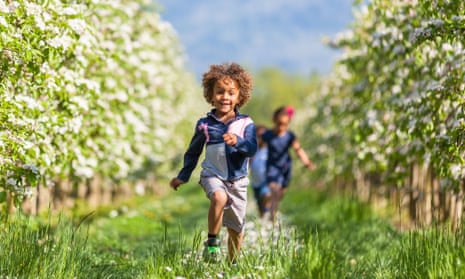With children now better at identifying Pokémon characters than common species of British plants and wildlife, there are concerns that we are increasingly losing touch with nature. In January, the UK government announced it would set £10m aside for outdoor learning – part of a 25-year environment plan that includes a pledge to “encourage children to be close to nature, in and out of school, with particular focus on disadvantaged areas”.
Worries about children becoming disconnected from nature are not new. A 2016 study by Natural England found that more than one in nine children had not set foot in a park, forest or other natural environment over the previous year. Children from low income and black, Asian and minority ethnic (BAME) families were particularly affected. Just 56% of under-16s from BAME households visited the natural environment at least once a week, compared to 74% from white households.
Technology plays a part in this “complex and systemic” issue, according to not-for-profit The Wild Network. Mark Sears, chief wild officer of the organisation, notes that other factors include parental fear, reduction of play time in schools and lack of green space. While initiatives such as those encouraging street play can help – particularly for children from disadvantaged backgrounds who face declining opportunities for outdoor play [pdf] – overcoming the barriers is not necessarily an easy task.
“We’ll never be able to find the budget to attract the children’s attention like Facebook or Apple can,” explains Sears. “How do we find relationship and balance between screen time and wild time? Truly I think [that’s] the parenting challenge of our times.”Conversations about the best way to tackle the issue are beginning to happen across many levels of education. In 2016, 15-year-old bird watcher Mya-Rose Craig organised a Race Equality in Nature conference in Bristol to bring together experts from nature conservation, universities and schools and discuss overcoming barriers that leave BAME children without equal access to nature. The idea came after she saw the impact her summer nature camps, which she has run since 2013, had on BAME children from inner-city Bristol.
“Last year, most [of the attendees] were aged 10 or 11 years old, and all lived in one of the most deprived wards in the city,” she says. “The camp was a real eye-opener in that the children all engaged with their natural surroundings. One child described how in the city there was nothing but the smell of pollution, but in the countryside ... it was a good smell, the smell of fresh air. None of the children had seen cows before or even stroked dogs.”
There’s an increasing interest from schools looking to improve all children’s access to nature through programmes like forest schools, which promote outdoor play. The Forest School Association, a professional body, says its membership has increased from 200 level three forest school practitioners five years ago to 2,000 this year.
Jon Steele, a forest school leader in north Wales, says that he’s seen how outdoor education can be particularly helpful for children with challenging behaviour, some of whom come from deprived backgrounds. “There are no walls so [they] don’t feel penned in,” he says. “Teachers will come up to me and say ‘wow, I’ve never seen him so calm, he usually kicks off’.”
In Devon, Christina Turley, an English teacher at South Dartmoor Community College, takes groups of secondary school children struggling with literacy away on weekends run by Embercombe, a sustainable living education centre. The programme, called Tribe, focuses on shelter building, nature identification, crafts and tool work, and helps children develop mindfulness and an appreciation for the natural environment. Turley says it makes a real difference to pupils’ self esteem, literacy and empathy, even after they return to school. Forty per cent of the children on the Tribe project are from disadvantaged backgrounds.
“Our young people report that Tribe makes them feel calm and relaxed,” says Turley. “It helps them to see themselves as skilled and talented people, makes them realise they are equal to everyone else, and helps them to understand other people’s emotions. They feel more connected to nature, learn about creatures and birds, and look forward to coming to school.”
Encouraging children to get outside – whatever background they’re from – doesn’t have to be as difficult as changing the founding principles of a school, spending money hiring a coach and driving an hour out of the city, or organising an away weekend. Sears says that one way to help children get more access to nature is to challenge assumptions about where nature is. “If we could start to re-imagine our canal banks, little patches of green space and the edges of our cities, and see them for their wild value we might start to overcome these barriers,” he says.
After working on this issue for five years, Sears believes this isn’t just about children. Their disengagement with the natural world is an indicator of a broader problem, a disconnection with nature, that needs to be addressed. “It’s about all of us,” he adds. “This [is] not just how we educate children, but other issues like how we design our cities, the role of advertising and children, how we bring technology appropriately into our lives. All of these things are contributing factors to the wildness of our children.”
Follow us on Twitter via @GuardianTeach, like us on Facebook, and join the Guardian Teacher Network the latest articles direct to your inbox
Looking for a teaching job? Or perhaps you need to recruit school staff? Take a look at Guardian Jobs, the education specialist.

Comments (…)
Sign in or create your Guardian account to join the discussion